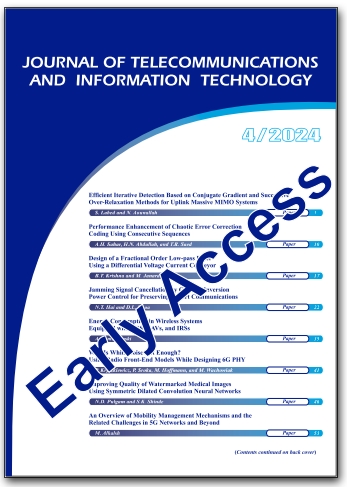A New Tree Quantum Key Agreement Protocol for Secure Multiparty Communication
DOI:
https://doi.org/10.26636/jtit.2024.4.1711Keywords:
BB84 protocol, quantum efficiency, quantum key agreement, tree topologyAbstract
The Tree Multiparty Quantum Key Agreement Protocol (TMQKAP) is introduced as a novel solution for secure quantum key agreement among multiple participants, specifically tailored for tree topologies. Based on the BB84 protocol, TMQKAP employs hierarchical tree structures and XOR operations to facilitate efficient and secure key generation. Key elements are exchanged among participants in an equitable manner, ensuring that each participant contributes equally to the generation of the shared key. The protocol demonstrates robust security, effectively defending against both external and internal attacks, and achieves a quantum efficiency of 1/2 (N −1), where N is the number of participants. Thorough security analysis and simulations show TMQKAP’s robustness against various attacks while maintaining high efficiency. Additionally, the protocol is readily implementable with current quantum technologies, utilizing single-photon transmission to facilitate secure key distribution.
Downloads
References
[1] Y. Shen, Z. Sun, and T. Zhou, "Survey on Asymmetric Cryptography Algorithms", 2021 International Conference on Electronic Information Engineering and Computer Science (EIECS), Changchun, China, 2021. DOI: https://doi.org/10.1109/EIECS53707.2021.9588106
View in Google Scholar
[2] Y. Cheng, Y. Liu, Z. Zhang, and Y. Li, "An Asymmetric Encryption-based Key Distribution Method for Wireless Sensor Networks", Sensors, vol. 23, no. 14, 2023. DOI: https://doi.org/10.3390/s23146460
View in Google Scholar
[3] V. Martin, J. Martinez-Mateo, and M. Peev, "Introduction to Quantum Key Distribution", in: Wiley Encyclopedia of Electrical and Electronics Engineering, 2017. DOI: https://doi.org/10.1002/047134608X.W8354
View in Google Scholar
[4] B.-X. Liu, R.-C. Huang, Y.-G. Fang, and G.-B. Xu. "Measurement-device-independent Multi-party Quantum Key Agreement", Frontiers in Quantum Science and Technology, vol. 2, 2023. DOI: https://doi.org/10.3389/frqst.2023.1182637
View in Google Scholar
[5] Y. Challal and H. Seba, "Group Key Management Protocols: A Novel Taxonomy", International Journal of Computer and Information Engineering, vol. 2, no. 1, 2008.
View in Google Scholar
[6] N. Zhou, G. Zeng, and J. Xiong, "Quantum Key Agreement Protocol", Electronics Letters, vol. 40, no. 18, pp. 1149-1150, 2004. DOI: https://doi.org/10.1049/el:20045183
View in Google Scholar
[7] B. Liu, D. Xiao, H.-Y. Jia and R.-Z. Liu, "Collusive Attacks to ‘Circle-type’ Multi-party Quantum Key Agreement Protocols", Quantum Information Processing, vol. 15, pp. 2113-2124, 2016. DOI: https://doi.org/10.1007/s11128-016-1264-5
View in Google Scholar
[8] K.-F. Yu et al., "Design of Quantum Key Agreement Protocols with Fairness Property", arXiv, 2015.
View in Google Scholar
[9] S.-K. Chong and T. Hwang, "Quantum Key Agreement Protocol Based on BB84", Optics Communications, vol. 283, no. 6, pp. 1192-1195, 2010. DOI: https://doi.org/10.1016/j.optcom.2009.11.007
View in Google Scholar
[10] Z. Sun et al., "Improvements on Multiparty Quantum Key Agreement with Single Particles", Quantum Information Processing, vol. 12, pp. 3411-3420, 2013. DOI: https://doi.org/10.1007/s11128-013-0608-7
View in Google Scholar
[11] R.-H. Shi and H. Zhong, "Multi-party Quantum Key Agreement with Bell States and Bell Measurements", Quantum Information Processing, vol. 12, pp. 921-932, 2013. DOI: https://doi.org/10.1007/s11128-012-0443-2
View in Google Scholar
[12] X.-R. Yin, W.-P. Ma, and W.-Y. Liu, "Three-party Quantum Key Agreement with Two-photon Entanglement", International Journal of Theoretical Physics, vol. 52, no. 11, pp. 3915-3921, 2013. DOI: https://doi.org/10.1007/s10773-013-1702-4
View in Google Scholar
[13] G.-B. Xu, Q.-Y. Wen, F. Gao, and S.-J. Qin, "Novel Multiparty Quantum Key Agreement Protocol with GHZ States", Quantum Information Processing, vol. 13, p. 2587-2594, 2014. DOI: https://doi.org/10.1007/s11128-014-0816-9
View in Google Scholar
[14] Y.-F. He and W. Ma, "Quantum Key Agreement Protocols with Four-qubit Cluster States", Quantum Information Processing, vol. 14, no. 9, pp. 3483-3498, 2015. DOI: https://doi.org/10.1007/s11128-015-1060-7
View in Google Scholar
[15] Z. Sun et al., "Multi-party Quantum Key Agreement by an Entangled Six-qubit State", International Journal of Theoretical Physics, vol. 55, pp. 1920-1929, 2016. DOI: https://doi.org/10.1007/s10773-015-2831-8
View in Google Scholar
[16] P. Wang, R. Zhang, and Z. W. Sun, "Practical Quantum Key Agreement Protocol Based on BB84", Quantum Information and Computation, vol. 22, pp. 241-250, 2022. DOI: https://doi.org/10.26421/QIC22.3-4-3
View in Google Scholar
[17] P.W. Shor and J. Preskill, "Simple Proof of Security of the BB84 Quantum Key Distribution Protocol", Physical Review Letters, vol. 85, no. 2, p. 441-444, 2000. DOI: https://doi.org/10.1103/PhysRevLett.85.441
View in Google Scholar
[18] M. Elboukhari, M. Azizi, and A. Azizi, "Verification of Quantum Cryptography Protocols by Model Checking", International Journal of Network Security and Its Applications, vol. 2, no. 4, pp. 43-53, 2010. DOI: https://doi.org/10.5121/ijnsa.2010.2404
View in Google Scholar
[19] A. Cabello, "Quantum Key Distribution in the Holevo Limit", Physical Review Letters, vol. 85, pp. 5635-5638, 2001. DOI: https://doi.org/10.1103/PhysRevLett.85.5635
View in Google Scholar
[20] H. Yang et al., "A Tree-type Multiparty Quantum Key Agreement Protocol Against Collusive Attacks", International Journal of Theoretical Physics, vol. 62, art. no. 7, 2023. DOI: https://doi.org/10.1007/s10773-023-05421-w
View in Google Scholar
[21] J. Gu and T. Hwang, "Improvement of Novel Multiparty Quantum Key Agreement Protocol with GHZ States", International Journal of Theoretical Physics, vol. 56, pp. 3108-3116, 2017. DOI: https://doi.org/10.1007/s10773-017-3478-4
View in Google Scholar
Downloads
Published
Issue
Section
License
Copyright (c) 2024 Rima Djellab, Youssouf Achouri, Malak Emziane, Lyamine Guezouli

This work is licensed under a Creative Commons Attribution 4.0 International License.




